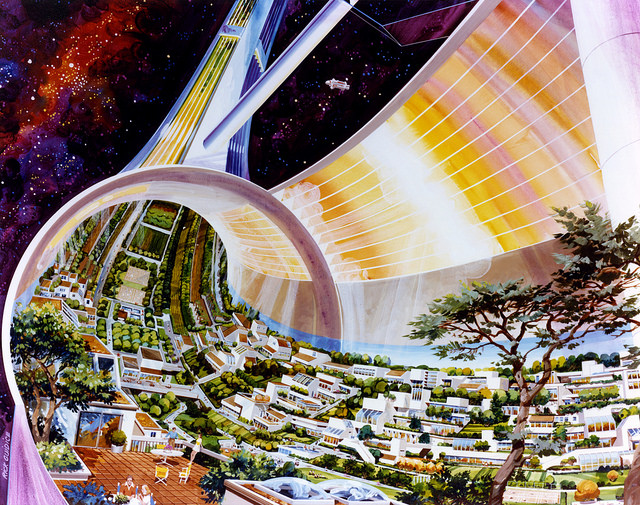AI, progress and happiness pt.3: the future and beyond

Investing in education, research and development
Man’s capacity for innovation and radical thinking, for setting new priorities and for pursuing Truth (whether scientific, artistic or philosophical), Knowledge and Happiness, are characteristics that will take a long time for AI systems to tackle — if they ever will, that is. And those should be the basic priorities for the current and upcoming generations.
We should focus our efforts on further developing our educational system, together with our conception of society’s functioning and purpose, towards what this new reality demands from us: to build citizens with strong theoretical foundations, clear minds, team spirit and great internal motivation towards creativity, adaptivity, and personal development.
It’s only this capacity for adaptiveness and constant re-education that can help us be prepared for the next stage of technological development.
In practical terms, this means that we need to rapidly increase the number of students, researchers, and professionals working in R&D positions.
This, along with a re-evaluation of a well-rounded Education, one that goes beyond the needs of the Industrial Era for human cogs and the needs of the Information Era for hyper-specialised scientists, towards creative spirits and citizens in the ancient Greek sense.
What’s especially interesting is that this necessity will lead to an ever faster technological progress, combining the optimism for our achievements with the concern for the breadth and depth of the dangers that we will face because of a misuse of our new tools.
This makes the need for real education, for a deep and true appreciation of the values of civilisation, respect, humanism, and of Life itself, greater than ever.
Optimism
My message is an optimistic one: the age of boring menial labor is over. In other words, we’re moving from grunt work to real work.
In contrast to the so-called Golden Age of Ancient Athens, in this new Golden Age there will be creators, philosophers, mathematicians, scientists, artists, entrepreneurs, and such, but no slaves.
And knowing how many great works (artistic, intellectual, scientific, philosophical, etc) were achieved in that era, when a relatively small number of people had the luxury to think and create free from menial labor (taking advantage, of course, of its slaves’ work), we can’t help but feel enthusiastic for a future society where such luxury will be within everybody’s reach.
From technological to social progress
Through technological progress we can achieve the abundance of goods and the availability of free time that will allow everybody to feel the joy of creativity, will simultaneously eliminating myriads of issues that plague billions of people.
To achieve this without getting burned by the immense power of our own technical arsenal, we will need to re-establish the fundamental values of our civilisation as the most important virtues of our society.
(I like to think that the fact that a lot of these values have strong historical ties in ancient Greece, lends special importance to our little country).
Recently, I happened to read the book, “Well, You Were Killed Early”, by the great writer and freedom fighter, Chronis Missios. Somewhere, Missios writes about the value of freedom, referring to a dialogue he had with one of his companions who taught him about communism:
“In the communist society work will be a game, it will be joy, it will be a sport. People won’t be working to feed themselves, but because of an urge to create and enjoy”.
We should not think too short of Chronis Missios. There was simply no way for him to even imagine that a few decades after he wrote his book, the dream of freeing people from toil and giving them the gift of creativity would be made possible by a hodgepodge of new technologies and business models, with AI playing the most important role in all this.
In this sense, AI offers us the opportunity of an unprecedented creative leap for mankind, and for human civilisation in its entirety.
These developments, of course, are not without caveats, and it’s up to the future generations to take advantage of AI and all the other immensely powerful technological tools at their disposal for the general good. Our one and only safety pin will be, once again, Knowledge and Wisdom, evenly distributed throughout society. In the end, freedom, and maybe happiness itself, amounts to the uninhibited access to knowledge for everybody.
From the layman to Stephen Hawking, we will be better of striving to understand and fully leverage Artificial Intelligence, this unprecedented and immensely powerful technical development, instead of being afraid of it.
An Answer to Federico
I can finally answer to Federico that, not only am I not afraid that AI will condemn us in unemployment, social exclusion, and civil unrest, but I am certain that, as soon as a critical mass of people finally understands its potential, we will not only witness new, life-changing technologies, but also new ways of thinking and new theories, that will lead humanity to a better, brighter and happier future, where freedom will finally be made into a concrete reality for everybody.
TL;DR;
To recap, the most important question brought forward by the advances in AI, is this:
Do we (as a society) have the right to burden people with tasks that don’t require thinking and creativity, while knowing fully well that we could easily automate them?
My response is clear:
No, we don’t have that right.
In the short and mid-term future, menial labor will be relegated to machines. This will free more people to feel the joy of creativity and increased job satisfaction. In this way, Artificial Intelligence will be a great leap forward for our civilisation.
Dimitris Tsingos
Founder and CEO,
StartTech Ventures
P.S. This post is the third and last part of a three-part series of posts in which I express my views and concerns about AI. The whole post is also available on Medium, where it was originally published.